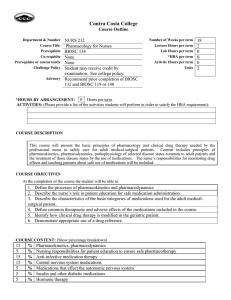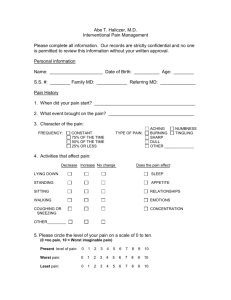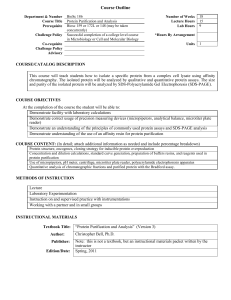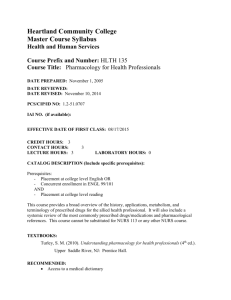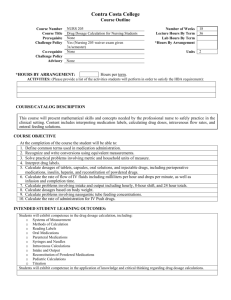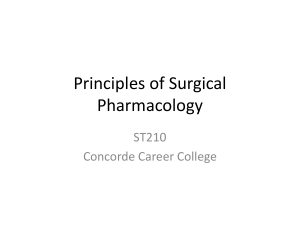NURS 212 S15 98KB Mar 10 2015 01:46:56 PM
advertisement
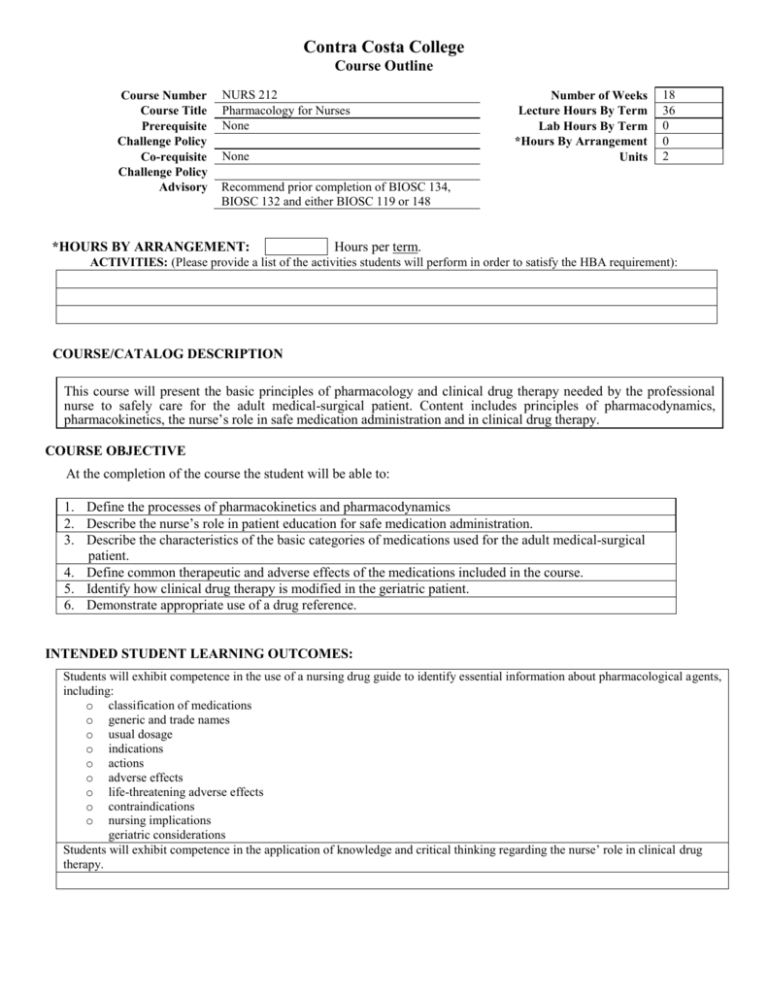
Contra Costa College Course Outline Course Number Course Title Prerequisite Challenge Policy Co-requisite Challenge Policy Advisory NURS 212 Pharmacology for Nurses None None Number of Weeks Lecture Hours By Term Lab Hours By Term *Hours By Arrangement Units 18 36 0 0 2 Recommend prior completion of BIOSC 134, BIOSC 132 and either BIOSC 119 or 148 *HOURS BY ARRANGEMENT: Hours per term. ACTIVITIES: (Please provide a list of the activities students will perform in order to satisfy the HBA requirement): COURSE/CATALOG DESCRIPTION This course will present the basic principles of pharmacology and clinical drug therapy needed by the professional nurse to safely care for the adult medical-surgical patient. Content includes principles of pharmacodynamics, pharmacokinetics, the nurse’s role in safe medication administration and in clinical drug therapy. COURSE OBJECTIVE At the completion of the course the student will be able to: 1. Define the processes of pharmacokinetics and pharmacodynamics 2. Describe the nurse’s role in patient education for safe medication administration. 3. Describe the characteristics of the basic categories of medications used for the adult medical-surgical patient. 4. Define common therapeutic and adverse effects of the medications included in the course. 5. Identify how clinical drug therapy is modified in the geriatric patient. 6. Demonstrate appropriate use of a drug reference. INTENDED STUDENT LEARNING OUTCOMES: Students will exhibit competence in the use of a nursing drug guide to identify essential information about pharmacological agents, including: o classification of medications o generic and trade names o usual dosage o indications o actions o adverse effects o life-threatening adverse effects o contraindications o nursing implications geriatric considerations Students will exhibit competence in the application of knowledge and critical thinking regarding the nurse’ role in clinical drug therapy. COURSE CONTENT (Lecture): Pharmacokinetics, pharmacodynamics Nursing responsibilities for patient education to ensure safe pharmacotherapy Anti-infective medication therapy Central nervous system medications Medications that effect the autonomic nervous system Insulin and other diabetic medications Hormone therapy Cardiovascular medications Respiratory medications Gastrointestinal medications Use of a drug reference and writing a drug card Use of medications in the geriatric patient COURSE CONTENT (Lab): METHODS OF INSTRUCTION: Lecture/discussion Small group discussions Drug cards (homework) INSTRUCTIONAL MATERIALS: NOTE: To be UC/CSU transferable, the text must be dated within the last 7 years OR a statement of justification for a text beyond the last 7 years must be included. Textbook Title: Basic Pharmacology for Nurses, Study Guide for Basic Pharmacology, Davis’s Drug Guide for Nurses Author: Clayton, B., Willinhganz, M., Clayton, B. Willinhganz, M., Deglin, J. & Vallerand, A. Publisher: Elsevier, St. Louis, MO, Elsevier, St. Louis, MO., F.A. Davis, Philadephia. Edition/Date: 16th Ed. 2013, 16th Ed., 2013. 13th Ed. 2013 Textbook Reading Level: Justification Statement: (For textbook beyond 7 years) Lab Manual Title (if applicable): Author: Publisher: Edition/Date: OUTSIDE OF CLASS WEEKLY ASSIGNMENTS: Title 5, section 55002.5 establishes that a range of 48-54 hours of lecture, study, or lab work is required for one unit of credit. For each hour of lecture, students should be required to spend an additional two hours of study outside of class to earn one unit of credit. Title 5, section 55002(a) 2F establishes coursework should call “for critical thinking and the understanding and application of concepts determined by the curriculum committee to be at college level.” For degree applicable courses: List one example of critical thinking out-of-class assignments Outside of Class Weekly Assignments Hours per week Weekly Reading Assignments (Include detailed assignment below, if applicable) 3 Weekly text chapters/units readings related to course schedule. For example, Week 1 Topic: Foundations of Pharmacology, Pharmacokinetics, Pharmacodynamics. Assigned readings: Chapters 1, 2, 3, 4. Weekly Writing Assignments (Include detailed assignment below, if applicable) 1 Assigned drug card completion and completion of workbook assignments. Weekly Math Problems (Include detailed assignment below, if applicable) Lab or Software Application Assignments (Include detailed assignment below, if applicable) Other Performance Assignments (Include detailed assignment below, if applicable) STUDENT EVALUATION: (Show percentage breakdown for evaluation instruments) Title 5, section 55002 (a) 2A requires that the grade be based on demonstrated proficiency in subject matter. For degree applicable courses: Course requires essay writing, or, in courses where the curriculum committee deems appropriate, problem solving exercises, or skills demonstrations by students. Title 5, section 55002(a) 2F requires that coursework call for critical thinking and the understanding and application of concepts determined by the curriculum committee to be at college level. For degree applicable courses: List (an) example(s) of methods of evaluation that assess critical thinking. 80 10 10 % Essay % Computation or Non-computational Problem Solving Skills % Skills Demonstration % Objective Examinations Four multiple choice exams and four quizzes. Passing grade for this course is 75% Other (describe) % Drug Cards (10) completion % Final paper consists of 5 pages discussing pharmacology related to the nursing process % GRADING POLICY: (Choose LG, P/NP, or SC) Pass / No Pass x Letter Grade 90% - 100% = A 80% - 89% = B 70% - 79% = C 60% - 69% = D Below 60% = F 70% and above = Pass Below 70% = No Pass Prepared by: Ron Morrison, MS, RN Date: February 20, 2015 Revised form 08/14 Student Choice 90% - 100% = A 80% - 89% = B 70% - 79% = C 60% - 69% = D Below 60% = F or 70% and above = Pass Below 70% = No Pass
